Oppression Transcends National Boundaries
Harassment for Teen Who Shot the Fateful Video
‘North Star’ Reboot One of ‘Radical Incompetence’
Black Enterprise ‘Almost Completely Online’
N.Y. Times Scores With Call to Rename Bases
Lockdown on Reservations Hurts Native Newspaper
[btnsx id=”5768″]
Comments by David “Sideman” Whitely, BBC 1Xtra presenter and comedian, were reposted worldwide. (Credit: Twitter)
Homepage photo: A mural in Rome (Credit: News1 English)
Oppression Transcends National Boundaries
The world is reacting to the death of George Floyd with alarm, but for black people abroad, including journalists, the horror has special relevance. Some relate it to their treatment in their own country. Many place it in historical terms, going back to slavery.
“There has been an outcry across Africa about the George Floyd case, the like of which I have not seen before,” Senegal-based Djibril Diallo, president and CEO of the African Renaissance and Diaspora Network Inc., who is active in the National Association of Black Journalists, messaged Journal-isms on Saturday.
“Individually and collectively Africans are organizing protests expressing solidarity with George Floyd. The African Union Commission issued an official statement from the chairperson. There have been reports of protests in Monrovia, Lagos and Abuja.
“The Africans have been very active in the social media.
“What is happening in Africa is what Sheila Walker[, the African American anthropologist,] referred to through the words of the Afro-Cuban poet [Nicolas Guillen] who said ‘sin conocernos nos reconoceremos’ (without knowing each other we will recognize each other). Very encouraging indeed about the strengthening of ties between Africa and its sons and daughters in the Diaspora.”
 Some of the commentary from the continent has been harsh. “Burning Minneapolis and charred buildings remind Americans that they haven’t radically changed since the dark night of slavery,” wrote Gamal Nkrumah (pictured), an editor at al-Ahram Weekly in Cairo and the son of Ghana’s first president, Kwame Nkrumah. He wrote for the Italian publication Immagina.
Some of the commentary from the continent has been harsh. “Burning Minneapolis and charred buildings remind Americans that they haven’t radically changed since the dark night of slavery,” wrote Gamal Nkrumah (pictured), an editor at al-Ahram Weekly in Cairo and the son of Ghana’s first president, Kwame Nkrumah. He wrote for the Italian publication Immagina.
According to Google Translate, Nkrumah wrote in Italian, “To understand the macabre assassination of George Floyd and what follows, history obliges us once again to ask ourselves two paradoxical and simple questions, which still many Americans do not want to answer. Who systematically exterminated Native Indians? Who captured blacks in Africa, transported by ship and enslaved on the continent? For Europeans the answer is simple: the settlers who settled in North America committed cruel acts and exterminated the native peoples. Africans were spared only because they served [as] slaves as a workforce . . . .”
Black people abroad were commenting even before the death Monday of Floyd, who cried out “I can’t breathe” after Derek Chauvin, a now-fired white Minneapolis police officer, kneeled on his neck for eight minutes and 46 seconds, killing him. There was the recently publicized case of Ahmaud Arbery, a 25-five-year-old black man who was shot dead in February while out for a run in Brunswick, Ga.
 Carol Rock (pictured), a Dutch native who has lived in New York, echoed Nkrumah’s historical references. She wrote Thursday for the Dutch website dewereldwijven.com, which champions women’s issues, “After the Second World War, we saw how the black men who fought for the freedom of Europe were later forgotten.
Carol Rock (pictured), a Dutch native who has lived in New York, echoed Nkrumah’s historical references. She wrote Thursday for the Dutch website dewereldwijven.com, which champions women’s issues, “After the Second World War, we saw how the black men who fought for the freedom of Europe were later forgotten.
“To this day, their names are not mentioned anywhere during commemorations. . . . We saw it when five officers were on Mitch Henriquez’s neck until he choked. We see it every day when our sons, our uncles, fathers, are arrested again and again, because they were able to buy a beautiful car thanks to hard work.
“The divide and rule tactics that the colonizer successfully employed for centuries has nested the idea that the black man should always be at the bottom of the ladder deep within the global subconscious of humanity. Yes, even with people who look like me, so deeply,” Rock wrote in Dutch on Friday, according to Google Translate.
Dutch News reported in 2017, “Henriquez died in July 2015, a day after being arrested by a team of five officers at the Zuiderpark in The Hague. Police said they responded after he claimed to be carrying a gun. The public prosecution department said the officers were guilty of assault but should not be punished as they are suffering from post traumatic stress syndrome and that their families have been threatened. . . .”
I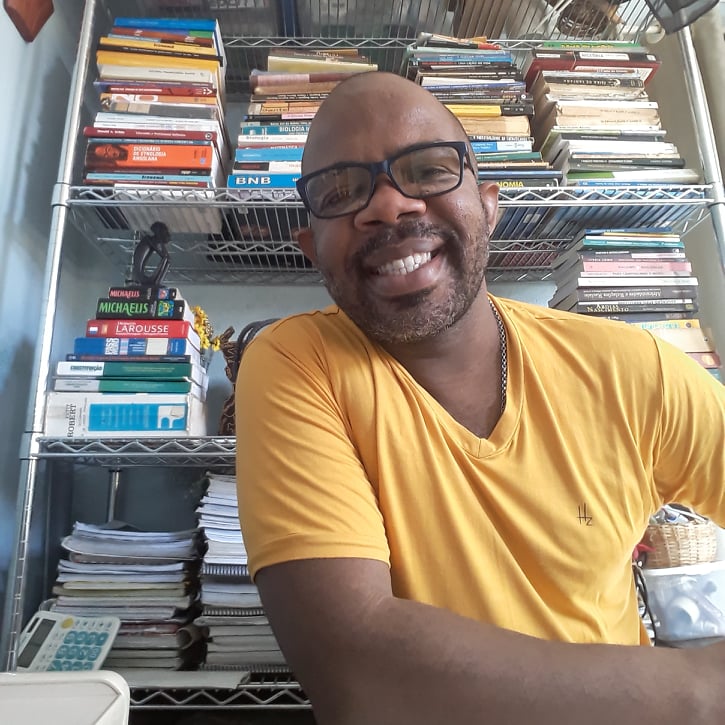 n Brazil, where 50.7 per cent of the population identifies as preto (black) or pardo (mixed ethnicity), a 2012 study indicated that black journalists are just 23 percent of the total number of professionals. George Oliveira (pictured) wrote in Portuguese about the Floyd case for correionago.com, a website of Instituto Mídia Étnica (Ethnic Media Institute), one of Brazil’s most influential Afro-Brazilian media companies.
n Brazil, where 50.7 per cent of the population identifies as preto (black) or pardo (mixed ethnicity), a 2012 study indicated that black journalists are just 23 percent of the total number of professionals. George Oliveira (pictured) wrote in Portuguese about the Floyd case for correionago.com, a website of Instituto Mídia Étnica (Ethnic Media Institute), one of Brazil’s most influential Afro-Brazilian media companies.
“News like this is part of a reality that makes us restless and apprehensive. But why bring cases from the USA if our reality here is similar?” Oliveira wrote, according to Google Translate.
“I believe that this is due to the fact that these cases have a worldwide repercussion and because there the black community has given more incisive responses on the streets, immediately after the fact. Here in Brazil the cases are quite recurrent, where we know that the target is black youth, who have been victims, even when they are inside their homes.” Oliveira is an economist and doctoral student in education.
Sounds from the protest in Toronto today as marchers made their way along Bloor St. #TorontoProtest #JusticeForRegis ? Imani Walker pic.twitter.com/PHHDYAAwx6
— blogTO (@blogTO) May 31, 2020
To the north, thousands rallied in Toronto Saturday in response to the death of 29-year-old Regis Korchinski-Paquet, who fell from a 24th floor balcony.
“Soon after Korchinski-Paquet died on Wednesday,” her mother, Claudette Beals-Clayton, “claimed in a video posted on Instagram that police officers ‘shoved’ Korchinski-Paquet off the apartment balcony. The Toronto Police Association, the union representing officers, later called the allegation of Korchinski-Paquet being shoved ‘unfounded.’ ” Nick Westoll and Ryan Rocca reported for Global News.
“The rally was a response to Korchinski-Paquet’s death as well as the wider issues of anti-Black and anti-Indigenous racism,” they wrote.
The headline Saturday in BlogTO, over a piece by black journalist Imani Walker, read, “This is why it was important to protest and march for Regis Korchinski-Pacquet in Toronto.”
In Europe, Rokhaya Diallo, a French-African writer and filmmaker who writes for The Washington Post, French Slate and other outlets, tweeted her frustration Thursday.
“4 years ago today, I was doing this report on the emergence of the #BlackLivesMatter generation,” Diallo wrote in French, displaying the front page of the French publication Liberation. “Nothing has changed since then: Black people are still dying from the historic stigma that strikes their skin color.”
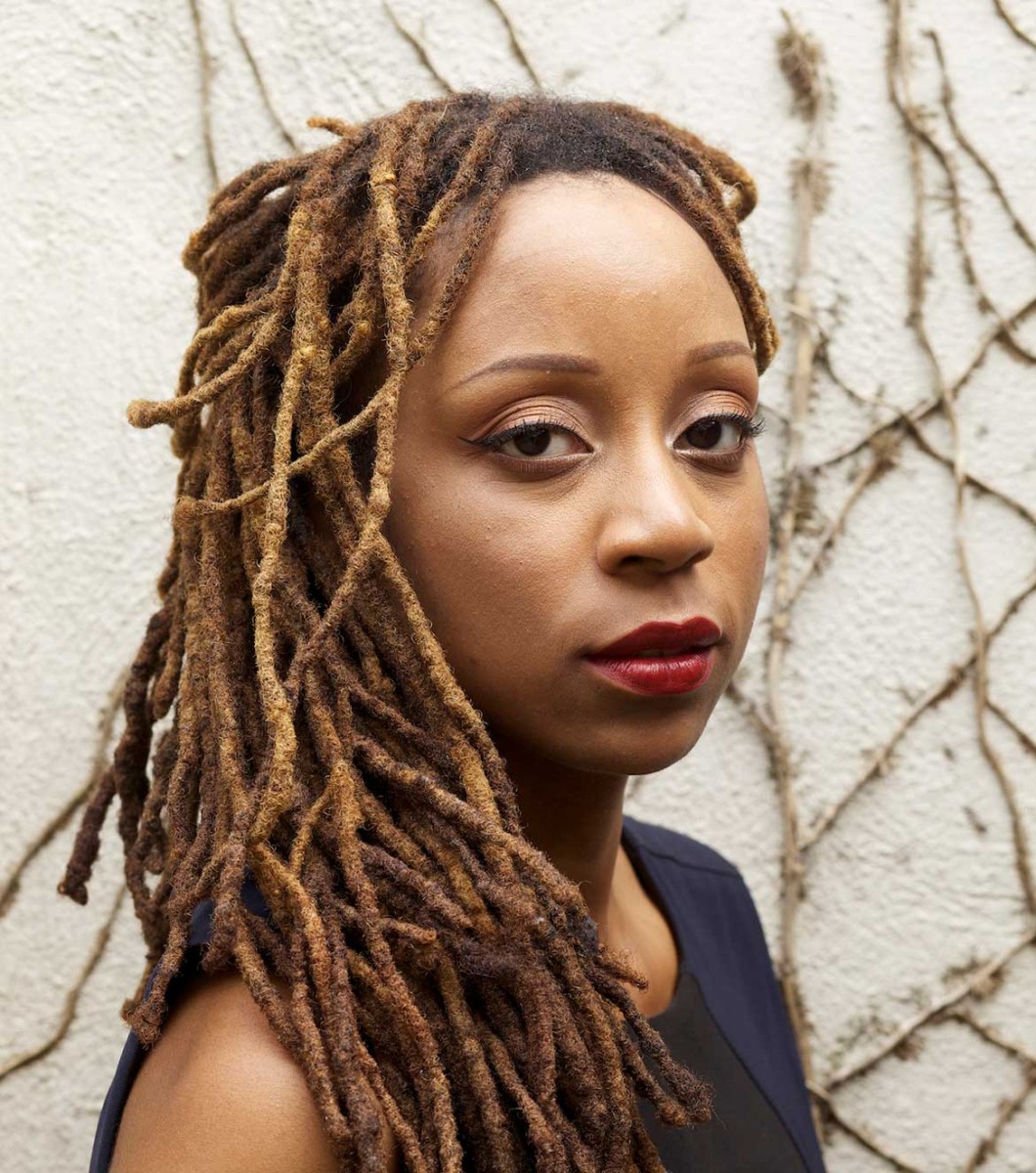 Clarice Gargard (pictured), identified via Google Translate as a program maker and freelance journalist, wrote in Dutch in the financial newspaper NRC Handelsblad. “The Netherlands also has a serious racism problem,” she said. “It is true that people of color are not shot in the street on the conveyor belt. But the dormant and institutional racism, which is often denied, can be just as evil.”
Clarice Gargard (pictured), identified via Google Translate as a program maker and freelance journalist, wrote in Dutch in the financial newspaper NRC Handelsblad. “The Netherlands also has a serious racism problem,” she said. “It is true that people of color are not shot in the street on the conveyor belt. But the dormant and institutional racism, which is often denied, can be just as evil.”
Gargard cited racial profiling by tax authorities in choosing whose returns to review.
“I begin to suspect that the lack of understanding or change — with all the information we have at our disposal — is not ignorance but unwillingness,” Gargard wrote. She recalled her king’s remarks about Nazi persecution of the Jews. “Because — remembering the words King Willem-Alexander said during his commemoration speech — racism that is not normal has actually become normal for a long time.”
Joel Dreyfuss, longtime U.S, journalist and a co-founder of the National Association of Black Journalists, along with others such as Djibril Diallo, Joe Ritchie and Sunni Khalid, helped find voices for this column. Dreyfuss said he was again struck by the importance of news media diversity.
“I was reminded how few prominent black voices are heard on French media,” Dreyfuss messaged Sunday.
“Yesterday, the unrest in the U.S. was a leading topic of discussion but I saw no black faces on the French TV panels. The editors called in their experts on America[;] few, if any, are black. Occasionally, Paris-based American novelist Jake Lamar is invited to French TV, along with activist-journalist Rokhaya Diallo, or social scientist Maboula Somahoro. But, to my knowledge, there is no regular black columnist or opinion writer in mainstream French media.”
- Cara Anna, Associated Press: In unusual move, US embassies in Africa speak up on Floyd
- Cholo Brooks, Global News Network, Liberia: Liberians Protest At U.S. Embassy For The Killing Of A Black Man In Minneapolis By Police Officers
- Julia Craven, Slate: This Week Has Happened Before: Black Americans are stuck in a loop of trauma.
- Leah Green, the Guardian, Britain: We shouldn’t have to witness George Floyd’s killing for it to spark outrage
- Jennifer Hassan and Siobhán O’Grady, Washington Post: Anger over George Floyd’s killing ripples far beyond the United States
- Tafi Mhaka, Al Jazeera: America cannot lecture Africans on human rights
- Trevor Noah, the Daily Show, Comedy Central: George Floyd, Minneapolis Protests, Ahmaud Arbery & Amy Cooper | The Daily Social Distancing Show (video)
- United Nations Commissioner on Human Rights: UN Human Rights Chief urges “serious action” to halt US police killings of unarmed African Americans
Harassment for Teen Who Shot the Fateful Video
“In the wake of mass outcry and protest over George Floyd’s death in Minneapolis, the person who brought his story to light is already experiencing harassment,” Elly Belle wrote Friday for refinery29.
”Darnella Frazier, the 17-year-old who took the video of George Floyd being suffocated and killed by police on Monday, now says that she’s facing a series of concerning messages online. Frazier took the video as proof of police brutality and the pain felt by thousands of people around the country, but is now the subject of some harassment as a result.
“According to her Facebook page, Frazier has been receiving numerous questions about why she didn’t fight off police for the duration of the 10 minute video depicting police kneeing Floyd in the neck. In her response, she says that she was scared as a 17-year-old to attempt to fight off any cops or help Floyd.
” ‘I don’t expect anyone who wasn’t placed in my position to understand why and how I feel the way that I do,’ she wrote on Facebook.
#LIVE @GovTimWalz on death of George Floyd, a black man seen pinned down in a video by a white police officer: “Thank God a young person had a camera to video it.”https://t.co/xMZsLiDrLj pic.twitter.com/oNWzyXWspf
— ABC7 Eyewitness News (@ABC7) May 29, 2020
“Later in the post she explained that she didn’t get involved because she didn’t want anyone else to be killed or put in the same position as George and she feared how the police would further retaliate. ‘If it wasn’t for me 4 cops would’ve still had their jobs, causing other problems,’ she wrote.
” ‘The police most definitely would’ve swept it under the rug with a cover up story. Instead of bashing me, THANK ME! Because that could’ve been one of your loved ones and you would want to see the truth as well. Anyone with something negative to say pls block me. I’m not forcing you to watch me.’
“The pain and trauma that Frazier addresses in her post has resonated with so many. In addition to what she’s now going through, she returned to the scene of the killing the day after George Floyd’s death looking visibly shattered. A video was captured and posted online by NowThis, showing Frazier saying, ‘I watched this man die,’ while crying. In the video, she hugs other members of the community protesting in that same area. . . .”
- Associated Press: Mississippi to drop charge of white ex-cop in man’s death
- Curtis Bunn and Nick Charles, NBC: Black men in Minneapolis outraged over Floyd killing, distrustful of judicial system
- Jessie Daniels with Brooke Gladstone, “On the Media,” WNYC-FM and NPR: The Weaponization of White Womanhood (podcast)
- Editorial, Atlanta Journal-Constitution: Atlanta can still show world a better way
- Editorial, Star Tribune, Minneapolis: Failure of leadership added to Twin Cities chaos
- Joyce Ferriabough Bolling, Boston Herald: George Floyd’s death a line in the sand for racial justice
- Patrice Peck, New York Times: Black Journalists Are Exhausted
- Society of Professional Journalists: An open letter to police officers and protesters [PDF]
- Brian Steinberg, Variety: Journalists Under Fire: Reporters Covering Protests Face Rubber Bullets, Tear Gas, Arrests
- Luke Tripp, Minnesota Spokesman-Recorder: The political and structural context of the police murder of George Floyd
- Apryl Williams with Brooke Gladstone, “On the Media,” WNYC-FM and NPR: Who is “Karen” and Why Does She Keep Calling the Police on Black Men? (podcast)
‘North Star’ Reboot One of ‘Radical Incompetence’
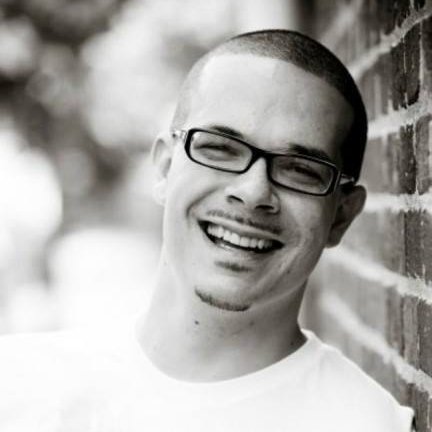 “When Shaun King (pictured) and progressive journalist Benjamin Dixon launched an ambitious multimedia reboot of Frederick Douglass’ abolitionist newspaper, The North Star, last February, it was celebrated across social media by prominent voices, including Susan Sarandon, Michael Eric Dyson, and Megan Mullally,” Kali Holloway wrote Tuesday for the Daily Beast.
“When Shaun King (pictured) and progressive journalist Benjamin Dixon launched an ambitious multimedia reboot of Frederick Douglass’ abolitionist newspaper, The North Star, last February, it was celebrated across social media by prominent voices, including Susan Sarandon, Michael Eric Dyson, and Megan Mullally,” Kali Holloway wrote Tuesday for the Daily Beast.
“A month later, the company boasted on Twitter that it already had ‘multiple angel investors’ and more than 30,000 subscribers contributing $5 per month for students and $10 a month and up for the general public.
“Subscribers at the highest giving levels, according to one former employee I spoke with, included Sigourney Weaver, Brené Brown, and black billionaire philanthropist Robert Smith, who gave a healthy $10,000 a month. . . .
“But 14 months after launching, almost none of what King promised to build has appeared and the site has struggled with issues that alienated many subscribers. The headquarters and television studio was quietly shuttered last summer, and all Atlanta-based staffers laid off. The mobile app disappeared for over a year, and the ‘full news site’ displays branded The North Star apparel for sale alongside relatively scant original journalism.
“King told me in an extensive email exchange for this story in early April that The North Star’s stumbles, including the dearth of deliverables promised, can be chalked up to the same overzealousness that has been the downfall of his other projects — the result of his tendency to take on too much, too soon. . . .
“But seven former employees of The North Star — three of whom spoke anonymously out of fear of reprisal by King, and six of whom were told they had to sign nondisclosure agreements to receive severances — said the issue was less King’s over-ambition than his absenteeism, insistence on absolute control, and radical incompetence. . . .
King, noted for his tweeting about racial injustices, has continued to focus on those, rather than the Daily Beast story or the North Star.

Black Enterprise ‘Almost Completely Online’
After 50 years as a print magazine, Black Enterprise has moved “almost completely online,” Earl (Butch) Graves Jr., president and CEO, announced May 20 at an event in which he told a black-media audience that “print is not going to survive,” Hazel Trice Edney reported last week for her Trice Edney News Wire.
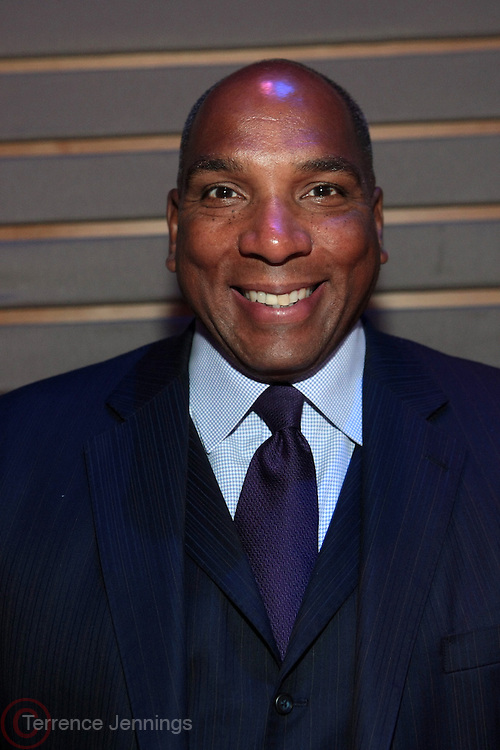 Publishers of black print newspapers cried foul because they were not represented on the panel at which Graves (pictured) made his remarks. The occasion was an NAACP “Black Media Speaks” forum.
Publishers of black print newspapers cried foul because they were not represented on the panel at which Graves (pictured) made his remarks. The occasion was an NAACP “Black Media Speaks” forum.
NAACP spokeswoman Aba Blankson replied to the National Newspaper Publishers Association, “While it was not our intent to exclude you, I recognize that was the impact. . . . I want to use this moment to strengthen our relationship.”
Graves was not the only bearer of what some might call tough love.
NAACP president Derrick Johnson was critical of the NAACP’s own quarterly magazine, The Crisis.
” ‘We run the Crisis Magazine. It’s been in continuous publication,’ he said. ‘But it’s not timely. And we have to recognize that until we can develop the publication to where people can consume it in this new media reality — that they see the value in it — I can’t fault others for not investing in Crisis when we have not kept up with the times. That’s the reality across the board when we’re talking about Black media.’
“Johnson said the Crisis has survived mainly because it’s been underwritten. ‘Because if it had to stand up on its own, it would have been out of business 50 years ago. So, we have to figure out a new business model to keep it moving.’ . . . “
Graves said his father, Earl Graves Sr., would not understand the decision to move Black Enterprise to the online platform. But, he said, “it has been done with great success and an astronomical increase in readership,” the story continued.
Graves Sr., who founded the magazine in 1970, died in April at 85.
He was proud that his company included not just the magazine, but had sponsored golf tournaments, created a private equity firm, and experimented with television and radio shows.
When Black Enterprise last filed circulation figures with the Alliance for Audited Media, in December 2014, its circulation stood at 517,920 and the magazine was losing its prominence.
The year before, Black Enterprise had dropped 35.4 percent in advertising dollars from the first quarter of 2013 compared with 2012, according to the Publishers Advertising Bureau.
Also in 2013, Black Enterprise reduced its frequency from 12 issues a year to 10.
Even then, however, the magazine foresaw changes in its business model.
“All things being equal, we intend to deliver content across 10 print issues roughly equivalent to what we’ve delivered in 12 issues each year,” Alfred Edmond, senior vice president/chief content officer, messaged Journal-isms then.
“The savings on printing and mailing two fewer issues each year is being shifted to our other media platforms, particularly digital, which has taken over from the print platform as a source of breaking news and delivers the responsiveness and interactivity our audience expects. Those expectations can hardly be met by printed newspapers, much less by monthly or even weekly magazines.”
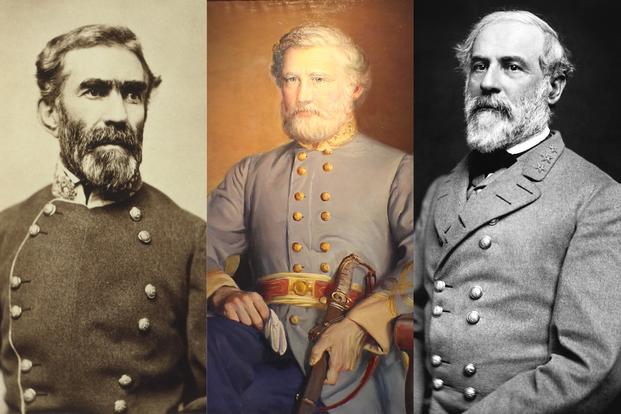
N.Y. Times Scores With Call to Rename Bases
An editorial in the New York Times calling for the renaming of the 10 military installations that bear the names of Confederate Army officers won “strong readership,” according to a Times spokeswoman.
 The essay, written by Pulitzer Prize winner Brent Staples (pictured), took up the full length of the spaces for editorials in the Sunday newspaper on May 24 and was posted online Saturday.
The essay, written by Pulitzer Prize winner Brent Staples (pictured), took up the full length of the spaces for editorials in the Sunday newspaper on May 24 and was posted online Saturday.
“Apologists often describe the names as a necessary gesture of reconciliation in the wake of the Civil War,” the editorial said. “In truth, the namings reflect a federal embrace of white supremacy that found its most poisonous expression in military installations where black servicemen were deliberately placed under the command of white Southerners — who were said to better ‘understand’ Negroes — and confined to substandard housing, segregated transportation systems and even ‘colored only’ seating in movie houses. . . .”
“Consider, for example, Fort Benning, Ga., which honors a Confederate general, Henry Lewis Benning, who devoted himself to the premise that African-Americans were not really human and could never be trusted with full citizenship. . . .”
The editorial garnered more than 1,500 comments on NYTimes.com, spokeswoman Ari Isaacman Bevacqua told Journal-isms on Thursday.
Around one thousand readers liked the following two comments:
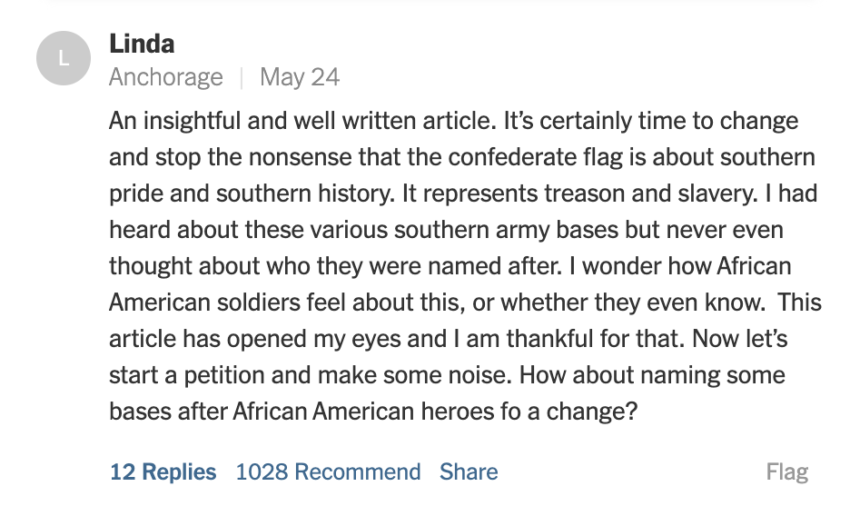
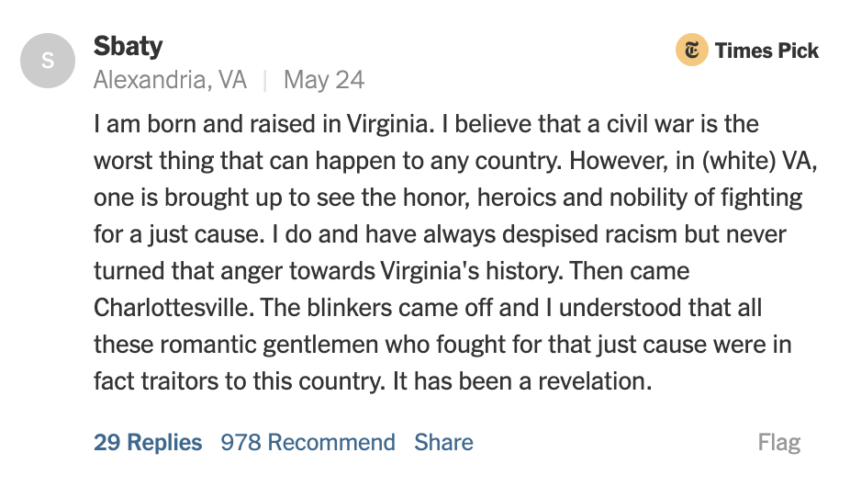
However Sen. Ted Cruz, R-Texas, disapproved:
On this Memorial Day, we give thanks to the heroic men & women who bravely fought and gave their lives to protect the NYT’s right to call the military Klansmen. https://t.co/eGGYwkAdbE
— Ted Cruz (@tedcruz) May 24, 2020
- Under the Radar, military.com: Ten Army Bases Named After Confederate Officers

“We only wish they had let us know before we printed so many papers.”
Lockdown on Reservations Hurts Native Newspaper
“Like small businesses across Indian Country, Native Sun News Today, felt, and is still feeling, the impact of the Coronavirus Pandemic,” the newspaper, based in Rapid City, S.D., editorialized Tuesday.
“We had a lot of customers on the Rosebud and Pine Ridge Reservations and we were not allowed to deliver papers there. We agree with the tribes that they have every right to secure their borders and to protect the people of the reservations.
“We print our papers on Tuesday night and the papers sit on the dock at our printer until Wednesday morning so there is [no] way the newspapers can be infected by the time they are delivered. We had our delivery person tested and she was negative for the virus. We also went by the memo sent out by [the Oglala Sioux Tribe] that newspapers were essential. But our driver was stopped from delivering, and like we said, we agree with the caution they are taking.
“We only wish they had let us know before we printed so many papers that we would not be able to deliver them. It hurt us pretty badly financially. . . .”
[btnsx id=”5768″]
Facebook users: “Like” “Richard Prince’s Journal-isms” on Facebook.
Follow Richard Prince on Twitter @princeeditor
Richard Prince’s Journal-isms originates from Washington. It began in print before most of us knew what the internet was, and it would like to be referred to as a “column.” Any views expressed in the column are those of the person or organization quoted and not those of any other entity. Send tips, comments and concerns to Richard Prince at journal-isms-owner@yahoogroups.com
View previous columns (after Feb. 13, 2016).
- Diversity’s Greatest Hits, 2018 (Jan. 4, 2019)
- Book Notes: Is Taking a Knee Really All That? (Dec. 20, 2018)
- Book Notes: Challenging ’45’ and Proudly Telling the Story (Dec. 18, 2018)
- Book Notes: Get Down With the Legends! (Dec. 11, 2018)
- Journalist Richard Prince w/Joe Madison (Sirius XM, April 18, 2018) (podcast)
- Richard Prince (journalist) (Wikipedia entry)
- February 2018 Podcast: Richard “Dick” Prince on the need for newsroom diversity (Gabriel Greschler, Student Press Law Center, Feb. 26, 2018)
- Diversity’s Greatest Hits, 2017 — Where Will They Take Us in the Year Ahead?
- Book Notes: Best Sellers, Uncovered Treasures, Overlooked History (Dec. 19, 2017)
- An advocate for diversity in the media is still pressing for representation, (Courtland Milloy, Washington Post, Nov. 28, 2017)
- Morgan Global Journalism Review: Journal-isms Journeys On (Aug. 31, 2017)
- Diversity’s Greatest Hits, 2016
- Book Notes: 16 Writers Dish About ‘Chelle,’ the First Lady
- Book Notes: From Coretta to Barack, and in Search of the Godfather
- Journal-isms’ Richard Prince Wants Your Ideas (FishbowlDC, Feb. 26, 2016)
- “JOURNAL-ISMS” IS LATEST TO BEAR BRUNT OF INDUSTRY’S ECONOMIC WOES (Feb. 19, 2016)
- Richard Prince with Charlayne Hunter-Gault,“PBS NewsHour,” “What stagnant diversity means for America’s newsrooms” (Dec. 15, 2015)
- Book Notes: Journalists Follow Their Passions
- Book Notes: Journalists Who Rocked Their World
- Book Notes: Hands Up! Read This!
- Book Notes: New Cosby Bio Looks Like a Best-Seller
- Journo-diversity advocate turns attention to Ezra Klein project (Erik Wemple, Washington Post, March 5, 2014)
![]()

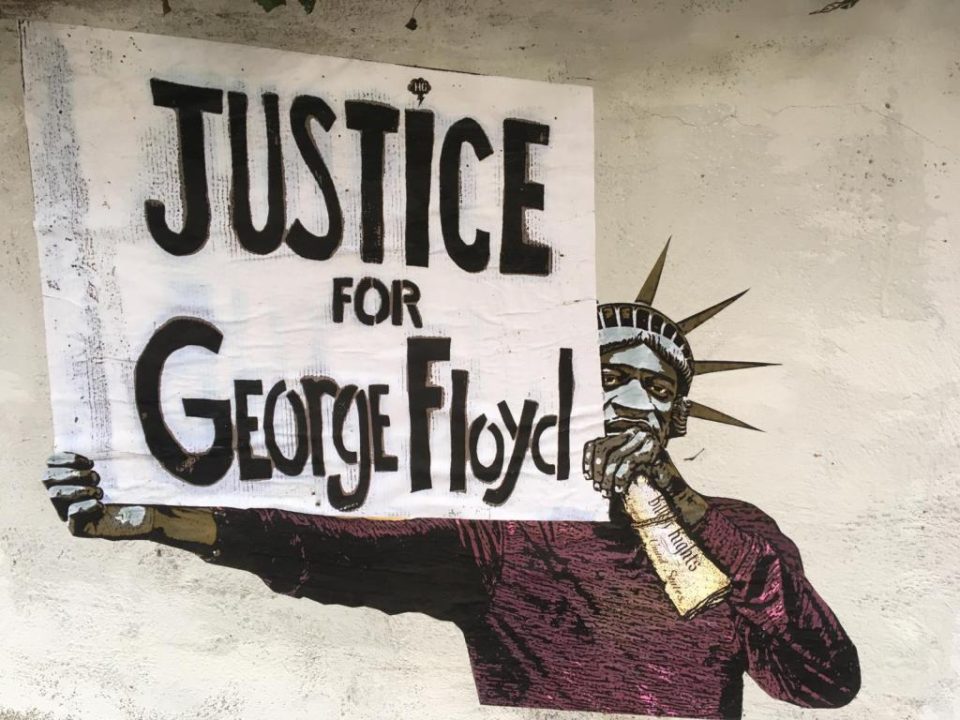
10 comments